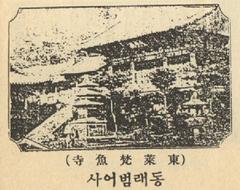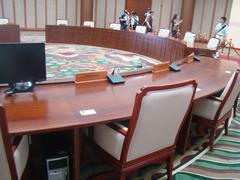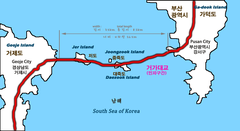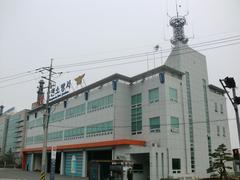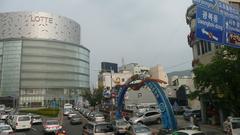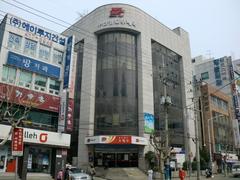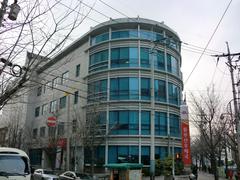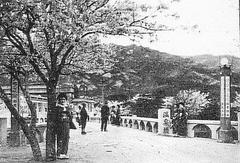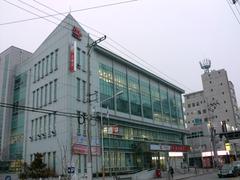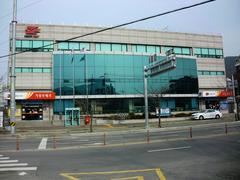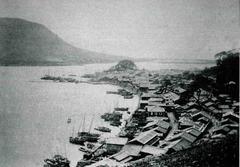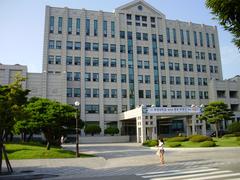Busan Dongnae Police Station: Visiting Hours, Services, and Historical Significance
Date: 03/07/2025
Introduction
Located in the heart of Busan’s historic Dongnae District, the Busan Dongnae Police Station is not only a cornerstone of public safety but also an important symbol of the area’s enduring heritage. Dongnae, known for its ancient roots and vibrant culture, presents an intriguing mix of past and present. While the police station is primarily a functioning law enforcement facility, its presence near significant landmarks such as the Dongnaeeupseong Fortress and Bokcheon Museum makes it a notable reference point for visitors navigating the district’s rich tapestry. This guide provides in-depth information on the station’s history, visitor protocols, accessibility, language assistance, and its role in the community—offering travelers valuable context for a rewarding experience in Dongnae.
For additional details on Busan’s attractions and travel logistics, consult the Busan Tourism Site and Busan Metro Information.
Table of Contents
- Introduction to Dongnae Police Station and Dongnae District
- Historical Overview and Community Role
- Visiting Dongnae Police Station: Essential Information
- Exploring Dongnae: Nearby Historical and Cultural Attractions
- Practical Travel Tips and Safety Guidance
- Frequently Asked Questions (FAQ)
- Additional Resources and References
Introduction to Dongnae Police Station and Dongnae District
Dongnae is one of Busan’s most storied districts, with a history stretching from the Neolithic period through the Joseon Dynasty to the present day. As Busan’s early urban core, it served as a center for administration, military strategy, and culture. The Dongnae Police Station, situated near key heritage sites, represents the intersection of tradition and modern public service, making it a useful point of contact for visitors exploring the district.
Historical Overview and Community Role
Roots in Busan’s Development
Dongnae’s significance began in ancient times, evolving through the Koch’ilsan-guk chiefdom and Silla Dynasty, and reaching prominence as a Joseon-era administrative and diplomatic hub. The magistrate’s office of old, responsible for governance and regional security, laid the groundwork for today’s civic institutions, including the Dongnae Police Station (busan.go.kr).
Modern Functions
Today, the Dongnae Police Station is the primary law enforcement center for Dongnae-gu. It operates multiple departments—patrol, investigation, traffic, and community policing—and oversees a network of local police boxes (파출소) to ensure rapid response and strong ties with residents (namu.wiki).
Beyond criminal investigations and public order, the station actively participates in community outreach, safety education, and festival support, reflecting Korea’s values of respect and harmony (citiesinsider.com).
Visiting Dongnae Police Station: Essential Information
Location and Transport
- Address: Centrally located in Dongnae-gu; search “Dongnae Police Station” or “동래경찰서” in mapping apps for precise directions.
- Subway: Walkable from Dongnae Station (Lines 1 & 4), Exit 3.
- Bus: Multiple city routes serve the vicinity (Busan Metro Information).
- Taxi: Readily available across Busan.
Visiting Hours and Access Policies
- Emergency Services: Available 24/7.
- Administrative Services: Typically open Monday–Friday, 9:00 AM–6:00 PM; closed on weekends and public holidays.
- Public Access: Entry is for official business (e.g., reporting incidents, lost property). General tourist visits inside are not permitted, though the exterior is viewable without restriction during daylight hours.
- Tickets: No admission fees.
Services for Tourists and Residents
- Crime reporting and emergency response
- Lost and found assistance
- Issuance of police certificates and loss reports (e.g., for passports)
- Safety information and community policing
- Support during local festivals and events
Accessibility Features
- Wheelchair-accessible entrances and pathways
- Accessible public transport routes nearby
- Signage and assistance available for those with mobility needs
Language Support
- Some officers speak basic English.
- Written notes in Korean and translation apps (e.g., Google Translate) are highly recommended.
- For interpretation, call the Korea Travel Hotline (1330).
Exploring Dongnae: Nearby Historical and Cultural Attractions
Visiting the police station situates you close to several of Dongnae’s top attractions:
- Dongnaeeupseong Fortress: Open daily 9:00 AM–6:00 PM (last admission 5:30 PM); free entry. Features reconstructed gates and ramparts (Visit Busan).
- Bokcheon Museum: Showcases ancient artifacts and regional history (mapcarta.com).
- Beokcheondong Gobung Ancient Tombs: Over 40 burial mounds, open to the public.
- Dongnae Market & Pajeon Street: Taste local delicacies and shop for crafts.
- Dongnae Hot Springs: A longstanding tradition for relaxation.
During major events such as the Dongnae Eupseong History Festival (October), the police station provides extra support for safety and information.
Practical Travel Tips and Safety Guidance
- Best Time to Visit: Daytime for general access and safety; avoid late-night visits unless for emergencies.
- Identification: Bring valid ID (passport for foreigners) when visiting for official matters.
- Conduct: Remain polite, use respectful language, and avoid photography inside government facilities without permission (travelermania.com).
- Safety: Dongnae is considered safe, especially with visible police presence. Exercise standard caution in crowded areas.
- Emergency Numbers: Police (112), Medical/Fire (119), Tourist hotline (1330).
Frequently Asked Questions (FAQ)
Q: Can tourists visit inside the Dongnae Police Station?
A: General entry is restricted to official business. The exterior and public spaces are accessible.
Q: What are the station’s hours?
A: Emergency services 24/7; administrative services Monday–Friday, 9:00 AM–6:00 PM.
Q: Is there an entry fee?
A: No, all essential services are free.
Q: Can I receive help in English?
A: Basic English is spoken by some officers; translation apps and the Korea Travel Hotline can assist.
Q: What should I bring for lost passport reporting?
A: Bring any available ID and details about the loss to obtain a loss report for embassy use.
Q: Is the area accessible for wheelchairs?
A: Yes, most public spaces and transport routes are accessible.
Additional Resources and References
- Official Busan Tourism Site
- Busan Metro Information
- Dongnae District Office
- Korean National Police Agency
- Visit Busan official website
- Then and Nows: Busan Historical Sites
Conclusion
The Busan Dongnae Police Station stands as a pivotal institution within one of Busan’s most historic districts, bridging the city’s storied past with modern civic life. While not a tourist attraction in the traditional sense, its strategic location and commitment to safety make it a valuable reference point for travelers exploring Dongnae’s rich heritage. By following the guidance in this article—regarding visiting hours, services, etiquette, and nearby sites—you can navigate Dongnae with confidence, ensuring both a safe and enriching experience.
For up-to-date safety information, travel tips, and cultural insights, download the Audiala app and follow us on social media. Enjoy your journey through Busan’s remarkable Dongnae district!
Sources
- Discover Dongnae Police Station: A Visitor’s Guide to Busan’s Historic District, 2025, Busan Tourism (http://busantour.kr)
- Busan Dongnae Police Station Visiting Hours, Location & Visitor Guide, 2025, Busan Metropolitan Government (https://www.busan.go.kr/eng/history-of-busan)
- Dongnae Police Station Visiting Hours, Services, and Tourist Information in Busan, 2025, Korean National Police Agency (https://police.go.kr/eng/index.do)
- Visiting Dongnae: Exploring Busan’s Historic Dongnaeeupseong Fortress and Cultural Landmarks, 2025, Visit Busan (https://www.visitbusan.net/index.do)
- Busan Metro Information, 2025, Busan Transportation Corporation (https://www.humetro.busan.kr/english/)
- Busan Historical Sites Overview, 2025, Then and Nows (https://thenandnows.com/busan-then-and-now/)
